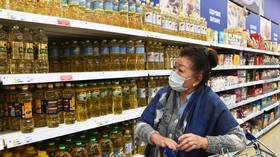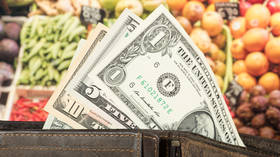UK food prices edge close to pandemic peak
British food price inflation hit a 14-month high in October amid supply chain issues, the latest report from UK consulting firm Kantar shows.
In the last four weeks, grocery price inflation in the country reached 2.1%, its highest rate since August 2020, when retailers were forced to cut promotions to keep merchandise on the shelves.
Also on rt.com One more sector of UK economy hit with severe labor shortageKantar analysts say the fastest-growing prices are currently seen in savory snacks, canned colas, and crisps. Prices of fresh bacon, vegetables, and pet food are declining.
As prices grow amid supply chain disruptions and truck driver shortages, Kantar notes that Britons tend to visit several supermarkets in search of the best deals.
“Already, households visit an average of 3.3 supermarkets per month in order to find the best value for money,” researchers state.They also note that ‘take-home’ grocery sales in the country fell by 1.9% year-on-year from August to October. Still, the sales were 7.3% higher than in pre-pandemic 2019.
Also on rt.com Shelves stripped bare across UK as Brits rush to panic-buy ahead of ChristmasThe report also notes that Britons’ “shopping habits are beginning to settle at a new baseline,” explaining that, in general, consumers tend to visit the supermarket less often, but buy more during these visits.
“Households visited the supermarket 15.7 times in the past month on average. That’s a slight increase from the 15.3 trips we saw at this time in 2020, but consumers are still making 40 million fewer trips per month than they were in 2019,” analysts say, adding that “at this rate of change, it would take three years to get back to our old shopping patterns.”
However, as the winter festive season is nearing, Kantar reports that Britons have already started to stock up on holiday goods, with frozen poultry sales up 27% year-on-year and 4.7 million households already buying mince pies.
For more stories on economy & finance visit RT's business section














